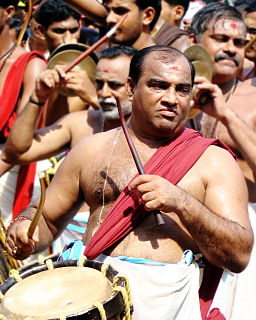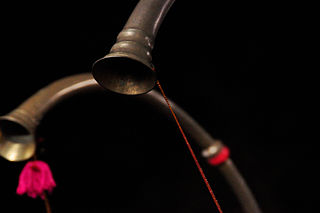
Pooram pronounced [puːɾam] is an annual festival, which is celebrated in temples dedicated to goddesses Durga or Kali held especially in Valluvanadu area and other adjoining parts of north-central Kerala after the summer harvest. Harimattom pooram is the one of the famous pooram in Ernakulam. An example of a famous pooram is Thirumandhamkunnu Pooram which has an active participation of 11 Lakh people across the country. Most pooram festivals have at least one ornately decorated elephant being paraded in the procession taken out of the temple precincts. However, there are some well known poorams, such as Anthimahakalankavu Vela, Chelakkara, Aryankavu Pooram at shoranur Palakkad and Machad mamangam near Wadakkanchery that do not use the caparisoned elephant, instead go for stilted mannequins of horses or bullocks. Vela is also a festival like pooram. Thrissur Pooram is the most famous of all poorams, known for fire works. The second best known Pooram in Kerala is Uthralikavu Pooram. Kavassery pooram is well known for fireworks during afternoon. Some other well-known pooram festivals are Arattupuzha-Peruvanam Pooram, Chalissery Pooram, Anthimahakalankavu Vela, Nenmara Vallangi Vela, Chinakathoor pooram, Mannarkkad Pooram, Kavassery Pooram, Pariyanampatta Pooram, Harimattom Pooram and Thirumandhamkunnu Pooram. Peruvanam-Arattupuza pooram is celebrating its 1436th year in 2018.

Mattanur Sankarankutty is an Indian percussionist who plays the chenda, Thayambaka, Panchari melam, and Panchavadyam. He was born in Mattanur, near Thalassery, in the Kannur district of Kerala. He was awarded the Padma Shri by the Government of India in 2009 and the Sangeet Natak Akademi Award in 2012.

Panchavadyam, literally meaning an orchestra of five instruments, is basically a temple art form that has evolved in Kerala. Of the five instruments, four — timila, maddalam, ilathalam and idakka — belong to the percussion category, while the fifth, kombu, is a wind instrument.

Pandi melam is a classical percussion concert or melam (ensemble) led by the ethnic Kerala instrument called the chenda and accompanied by ilathalam (cymbals), kuzhal and Kombu.

Panchari Melam is a percussion ensemble, performed during temple festivals in Kerala, India. Panchari Melam, is one of the major forms of chenda melam, and is the best-known and most popular kshetram vadyam genre. Panchari melam, comprising instruments like chenda, ilathalam, kombu and kuzhal, is performed during virtually every temple festival in central Kerala, where it is arguably presented in the most classical manner. Panchari, however, is also traditionally performed, with a touch of subtle regional difference, in north (Malabar) and south-central Kerala (Kochi). Of late, its charm has led to its performance even in deep-south Kerala temples.
Thayambaka or tayambaka is a type of solo chenda performance that developed in the south Indian state of Kerala, in which the main player at the centre improvises rhythmically on the beats of half-a-dozen or a few more chenda and ilathalam players around.

The Chanda is a cylindrical percussion instrument originating in the state of Kerala and widely used in Tulu Nadu of Karnataka and Tamil Nadu in India. In Tulu Nadu, it is known as chende. It is greatly identified as a cultural element in Kerala and Tulu Nadu.

The maddalam or madhalam is a drum made out of the wood of the jackfruit tree. It has two sides for playing, made out of leather, and has different kind of sounds on each side. The maddalam is a heavy instrument which is hung around the waist of the person playing, and the player stands all the while to perform. The maddalam is a vital instrument in traditional Kerala percussion ensembles like Panchavadyam, Keli and Kathakali orchestra.

Elathalam, or Ilathalam, is a metallic musical instrument which resembles a miniature pair of cymbals. This instrument from Kerala in southern India is completely made out of bronze and has two pieces in it.

The Kombu or Kompu also known as the Kombu Pattu is a wind instrument in Tamil nadu and Kerala. Usually played along with Panchavadyam, Pandi Melam, Panchari melam etc. This musical instrument is usually seen in south India. The instrument is like a long horn.

Cherpu is a suburb of Thrissur city, in Kerala state in south India. It is 12 kilometres south of Thrissur town and is on the Thriprayar road. It is dotted by a number of temples and has quite a few rivers flowing by its vicinity.
Uthramvilakku is a temple festival celebrated at Edakkunni in Ollur, south of Thrissur in central Kerala, south India. The highlight of the event is an over four-hour Panchari melam in the temple compound past midnight on the uthram day, with each of the five caparisoned elephants on the occasion carrying a deity each from as many temples.
In Carnatic music, Maddala Keli or Maddalapattu is a musical genre featuring a set of maddalam drums as the main instrument – not chenda drums – with support from a row of ilathalam. A Maddala Keli work with five maddalam players is called Panchamaddalakeli; with ten players, Dashamaddalakeli. It sticks mainly to an eight-beat rhythmic cycle called Chembada or adi talam. It also has a segment called Kooru, where rhythmic cycles can be the six-beat panchari (pancharikkooru), the 14-beat adantha (adantha-kkooru) and the ten-beat chamba (chambakkooru). Scholars say the ensemble of thayambaka was developed from maddala keli.
Kshetram vadyam is the ritual music of South India. This is the main traditional music of Kerala state. It is a percussion dominated music.
Kuzhal pattu is a form of traditional temple music practised in the Kerala state of India. It centers on the use of the kuzhal, a double reed wind instrument, and is typically performed at temple festivals.

Peruvanam Pooram is one of the most popular temple festivals of the South Indian state of Kerala. It is held at Peruvanam Temple in Cherpu, Thrissur District. Lord Shiva is the presiding deity of this temple.

Veekku Chenda or "Acchan Chenda" is a type of Chenda or drum used to keep the "thalam" or the basic rhythm while playing the Chenda. The "Chenda Vattam" of the "Veekku Chenda" is always the "Valam Thala" or the "Right Head" which is made of multiple layer of skin to produce a bass sound. The meaning of "Veekku" in Malayalam language is "beating hard". The artist produce sound on "Veekku Chenda" by hitting the drum using a stick without twisting or rolling his wrist.

Uruttu Chenda is a type of "Chenda" or drum used to play variations in Chenda music. It is used to lead the orchestra. It is called the ""Pramanavadhya"". The "Chenda Vattam" of the "Uruttu Chenda" is always the "Edam Thala" or the "Left Head" which is made of soft, single cow skin. The meaning of "uruttu" in Malayalam language is "rolling". The artist produce sound on "Uruttu Chenda" by rolling his right hand wrist. During the first beat the palm holding the stick will face the artist (in), then during the second beat the palm would face the opposite side (out). This is done by rolling the wrist.

Sadanam Divakara Marar was an Indian percussionist, known for his scholarship on sopana sangeetham, marappani, parisha vadhyam and thimila paani and his mastery over various temple and ritual percussion instruments of traditional Kerala music.
Pallavur Appu Marar (1928-2002) was an Indian percussionist, widely considered to be a maestro in the Pallavur (Palakkad) style of thayambaka, edakka, sopana sangeetham, melam and panchavadyam. He was the eldest of the three brothers, the other two being Pallavur Manian Marar and Pallavur Kunhikuttan Marar, who formed the famed Pallavur trio.











